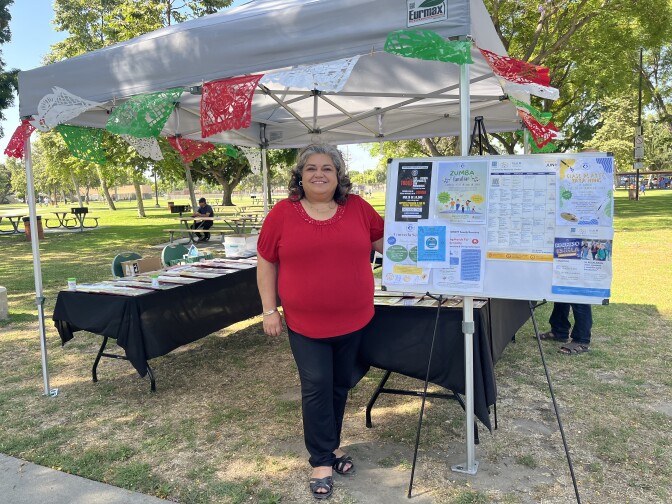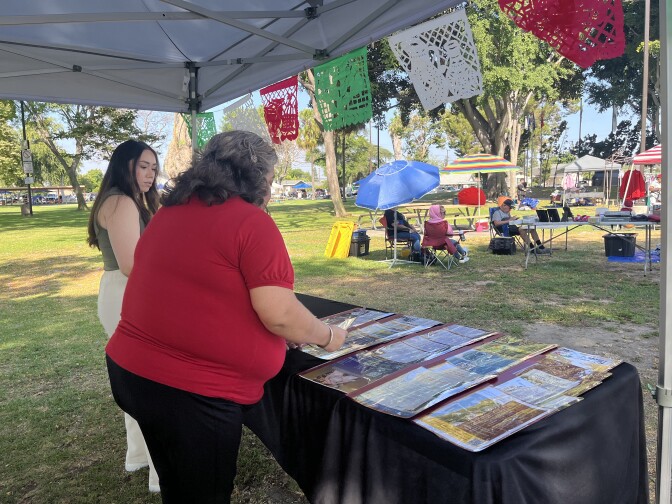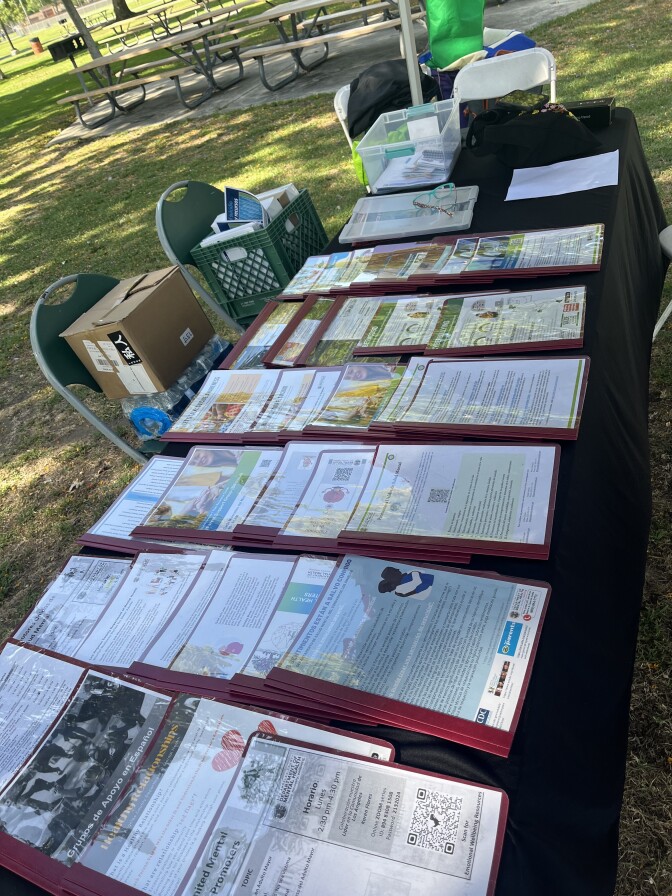This story is free to read because readers choose to support LAist. If you find value in independent local reporting, make a donation to power our newsroom today.
Why six southeast LA cities are calling out internet providers for ‘digital discrimination’

For residents of southeast L.A. County, it’s a common complaint. You pay the high rates for internet service — but that doesn’t mean it’s reliable.
That’s what Maria Padilla, a military mom in Bell Gardens, has experienced. She needs a strong Wi-Fi connection to call and email her two sons while they’re overseas or in the field. Instead, she pays $90 a month to avoid the spotty service that often comes with more affordable plans.
“If there’s bad reception, I miss their calls,” she said, adding that wealthier neighborhoods don’t seem to have these types of issues. “Why am I seeing that disparity?”
Aida Vega in Huntington Park agrees. “All of us moms know this is a problem [in our neighborhood].”
Vega pays about $75 per month for service, but said it tends to lag when too many people use the Wi-Fi at once.
“To me it doesn’t seem fair because I see other communities outside of [southeast L.A.] that don’t have these issues… they can watch videos and listen to music without a problem,” said Vega, a parent leader with the nonprofit Innovate Public Schools. “We don’t have that.”
Now the issue is being taken up on a higher level. Since May, six cities in southeast L.A. County have passed motions to hold internet companies accountable for offering slower, costlier service in low-income areas.
Local leaders are following the federal government's lead and declaring the practice “digital discrimination" — regardless of whether it's done intentionally. They also want to highlight how high prices mean many residents can’t afford to get online, leaving them out of much of modern life.
Advocates say internet companies tend to pour their resources into wealthier areas where they might see a greater return on investment.
On Tuesday, the Huntington Park City Council became the latest to pass a motion addressing the issue. Other partners include Maywood, South Gate, Bell Gardens, Cudahy and Commerce.
A community outreach approach
Because it’s a relatively new issue, advocates are using community outreach to help educate people on what digital equity is, how they can get involved and how to file complaints with the Federal Communications Commission.
That’s why on Friday mornings, Padilla sets up an information booth at Bell Gardens Veterans Park. She sets out binders full of free resources for the community — fliers, pamphlets and other handouts — including where you can go to learn basic computer skills for free.

Padilla volunteers as a parent leader with the Latino advocacy group Alliance for a Better Community, or ABC. She said many of her neighbors are eager to learn how to use computers and the internet so they don’t get left behind as technology continues to advance.
For others, it can take some convincing.
“I always tell people, ‘You can do it, let go of the fear, no pasa nada,’” she said. “If you accidentally delete everything, we can start over.”
Mobilizing parents
ABC is part of the Digital Equity L.A. coalition, or DELA, and works with groups like EveryoneOn to offer digital skills training in the region. It’s also been organizing hundreds of parents like Padilla who struggle with connection issues on the southeast side.
Padilla said it’s a matter of public safety, recalling an instance when an elderly man in the neighborhood lost his home because he wasn’t able to navigate an email account — and therefore wasn’t able to get the help he needed to manage his electronic payments.
“For me it was frustrating that because of an email, they took away the help he needed,” she said. “That shows you the importance of the internet and [digital] knowledge.”
Smaller municipalities don’t have the resources to set up their own complaint process like the one the city of L.A. is working on. Instead, advocates are organizing parents to “uplift the need and awareness" of digital discrimination and to show there is “local will” to solve the problem.
But first, they have to make sure residents know how to navigate digital tools, like laptops and websites.

“So many times folks tell us that they're paying close to $100 for internet, and it cuts out more than once during the week,” said Erika Cervantes, senior policy and advocacy manager at ABC. “So recognizing that doing something like that could be really intimidating, especially for community members who don't even have access to the internet or don't have the digital skills to do so."
In Bell Gardens, about 9% of residents don’t have Wi-Fi at home, according to U.S. Census data. But the city is surrounded by neighborhoods where more than 20% of homes lack service.
Councilmember Jorgel Chavez of Bell Gardens said the issue affects the entire region. The City Council unanimously passed a digital discrimination resolution in June.
“From every different angle, my community consistently is behind,” he said. “Honestly, I'm fed up about it. I know the rest of southeast L.A. is fed up and we want to make sure we make it loud and clear that we feel that we deserve better.”
Tackling digital discrimination
Huntington Park Mayor Karina Macias is planning to host local leaders and community groups later this year for a discussion on how they can work together to achieve digital equity.
The issue has been gaining momentum across the Gateway Cities region since last fall when the FCC adopted new rules to stop service providers from discriminating against customers based on race, income and other protected traits. The L.A. City Council unanimously approved the nation's first city-level policy in January.
“We’re really trying to find a solution and trying to help out our youth and our families,” Macias said. “And we just need that extra support to get it done.”
State bill stalls
A bill to address digital discrimination at the state level died in the Senate Appropriations Committee last week. It had been opposed by major telecom providers and industry groups.
Assemblymember Mia Bonta’s bill (AB 2239) would have codified the FCC's new rules and authorized the state attorney general to bring a civil action against private companies that violate state law.
“We are living in an unjust and inequitable moment of technology, where some have and some don’t,” Bonta said.
Representatives from the California Chamber of Commerce, California Broadband and Video Association and California Communications Association sent a letter to lawmakers, saying they shared Bonta's commitment to ensuring universal access to broadband — but opposed her bill's approach to the issue.
“We do not want to repeat the FCC’s mistakes in California, which would risk provoking costly litigation and delaying the deployment” of ongoing universal connectivity programs, the letter states.
Digital equity advocates said the effort to move the bill forward was an uphill battle because the broadband industry spent millions on lobbying efforts to stop it, including special gifts like basketball games.
US Telecom, a trade association that represents telecommunications-related businesses throughout the country, did not respond to a request for comment.
What’s next?
Cristal Mojica of the Michelson Center for Public Policy and the California Digital Equity Alliance said the state should consider other legal remedies and pass a bill to address the issue instead of "putting all of those cities that have more limited resources through that process.”
She said community groups have a lot of “myth busting” to do to reach lawmakers who are maybe newer to digital equity and discrimination issues.
“It's very much on their radar and they're gonna pour industry money as much as they can to try to stop it,” Mojica said, adding that advocates will continue to champion the issue and prepare to pick up the fight again in 2025.








